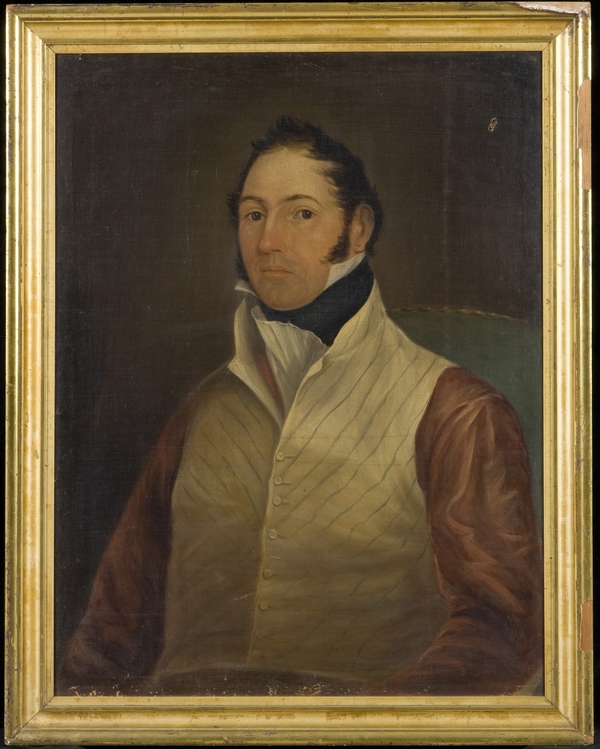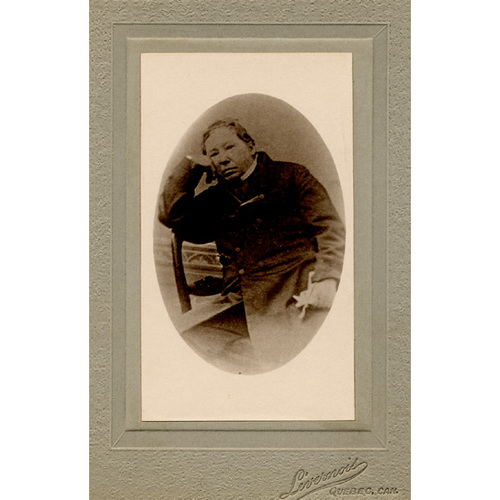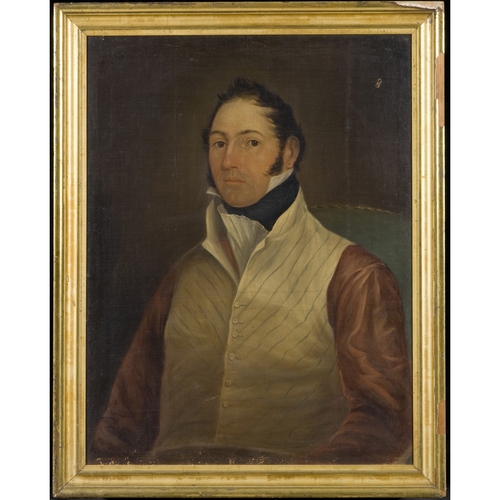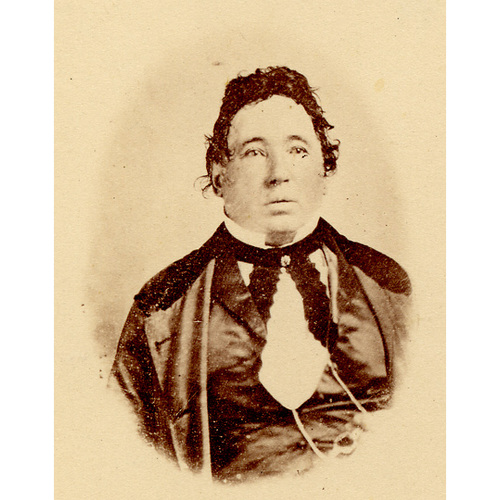
Source: Link
PAINCHAUD, JOSEPH, physician and surgeon; b. 23 Jan. 1787 at Quebec, son of François Painchaud, a navigator, and Marie-Angélique Drouin; d. 24 Aug. 1871 at Quebec.
On 9 Jan. 1811, after serving his apprenticeship under Dr James Fisher*, a surgeon attached to the Quebec garrison, Joseph Painchaud was authorized to practise medicine. He was a popular practitioner with the people of Quebec, and from morning to night was to be seen travelling the streets of the city, “usually making his house calls on horseback and wearing long Wellington boots and silver spurs.” On 5 June 1815, in the parish of Notre-Dame, he married Geneviève Parant.
In 1820 the Emigrant Hospital was opened in the Saint-Jean district. Painchaud was put in charge off the institution, and practised medicine and surgery there until 1834. In that year the hospital closed its doors, and the patients were transferred to the new marine hospital (called the Marine and Emigrant Hospital), where Painchaud, who had been taken on by James Douglas*, worked until his death [see Iffland]. Both by his teaching and by his monetary gifts, he contributed substantially to the progress of the hospital. Thanks to him and Dr Douglas, this institution became not only useful to all Quebec residents, but also “a school of surgery unrivalled on the North American continent.” In 1833 Painchaud was named doctor to the community of the Hôpital Général of Quebec, in place of Dr William Holmes. On 29 March 1845, he was one of those who obtained from the government of the Province of Canada the right to establish a school of medicine at Quebec. Painchaud, who had professed obstetrics and epidemiology at the Marine Hospital, gave instruction at the new Quebec Medical School in “the obstetrical art, and [the treatment of] women’s and children’s diseases.”
Throughout his whole career Painchaud endeavoured to develop a team spirit among his confrères. He took an active part in the founding of the Quebec Medical Society in 1826. He was noteworthy for the regular support he gave it, by publishing reassessments and periodical reviews of medical progress in Europe and the United States as well as in Canada. In the same period he was a member of a committee, probably the first, whose purpose was to recommend the setting up of a minimum schedule of medical fees, based on “three different rates for house visits, surgical operations, and deliveries and attendance on board ship.” As he also had been on the Quebec Medical Board since 1831, and had presided over it for many years, he had considerable influence with his confrères, governments, and in councils and medical societies. On 31 July 1831, as the most senior “licensed” doctor present, Painchaud was invited to preside at “the general meeting of the licensed doctors, surgeons and midwives living in the district of Quebec, a meeting called by a proclamation of His Excellency the governor in chief.” In 1837 the government of the country entrusted him with the post of commissioner responsible for supervising the application in the Quebec region of “the ordinance to prevent unlicensed persons from practising medicine and surgery in the province of Quebec or midwifery in the cities of Quebec or Montreal.”
In 1844 Painchaud started a new medical association intended to “give assistance to needy doctors unable to practise their profession either because of advanced age or because of infirmities, or to aid the widows and children, the latter until the age of 21.” This plan came to nothing, but in 1846 the doctors and surgeons of Lower Canada met at Trois-Rivières, to set up a society to ensure the regulation, control, and defence of medicine. Dr Painchaud argued vigorously in favour of such an organization, and outlined the reasons for the creation of a college of physicians and surgeons, pointing out in particular that the city of Quebec possessed all the institutions necessary in this respect. “Our hospitals,” he stated, “are open to students, and above all we have a Marine Hospital, the leader of the whole province, which for surgery is unequalled on this continent, and which alone attracts students from the four corners of the province.” Finally Painchaud’s initial proposal, that of 1844, was some years later to “give birth to the Canadian Medical Association.”
Joseph Painchaud, an influential member of the most important medical associations in the province, enjoyed great prestige and made a substantial contribution to the evolution and development of Canadian medicine. To relieve the sick, to improve the teaching of medicine, to create and develop hospital establishments: these were his daily concerns.
PAC, RG 4, B28, 48, 9 June 1811. Ahern, Notes pour l’histoire de la médecine, 231, 237, 309, 421, 456. C.-M. Boissonnault, “Création de deux écoles de médecine au Québec,” Laval médical (Québec), 39 (1968), 547–49. C.-A. Gauthier, “Histoire de la Société médicale de Québec,” Laval médical (Québec), 8 (1943), 84–110, 117. Ignotus [Thomas Chapais], “La profession médicale au Canada,” BRH, XII (1906), 147–50. Sylvio Leblond, “L’hôpital de la Marine de Québec,” L’ Union médicale du Canada (Montréal), mai 1951: P.-G. Roy, “L’Hôpital des émigrés du faubourg Saint-Jean à Québec,” BRH, XLIV (1938), 200–2.
Cite This Article
Charles-Marie Boissonnault, “PAINCHAUD, JOSEPH (1787-1871),” in Dictionary of Canadian Biography, vol. 10, University of Toronto/Université Laval, 2003–, accessed January 1, 2026, https://www.biographi.ca/en/bio/painchaud_joseph_1787_1871_10E.html.
The citation above shows the format for footnotes and endnotes according to the Chicago manual of style (16th edition). Information to be used in other citation formats:
| Permalink: | https://www.biographi.ca/en/bio/painchaud_joseph_1787_1871_10E.html |
| Author of Article: | Charles-Marie Boissonnault |
| Title of Article: | PAINCHAUD, JOSEPH (1787-1871) |
| Publication Name: | Dictionary of Canadian Biography, vol. 10 |
| Publisher: | University of Toronto/Université Laval |
| Year of publication: | 1972 |
| Year of revision: | 1972 |
| Access Date: | January 1, 2026 |





